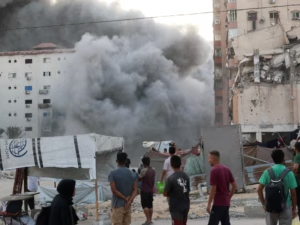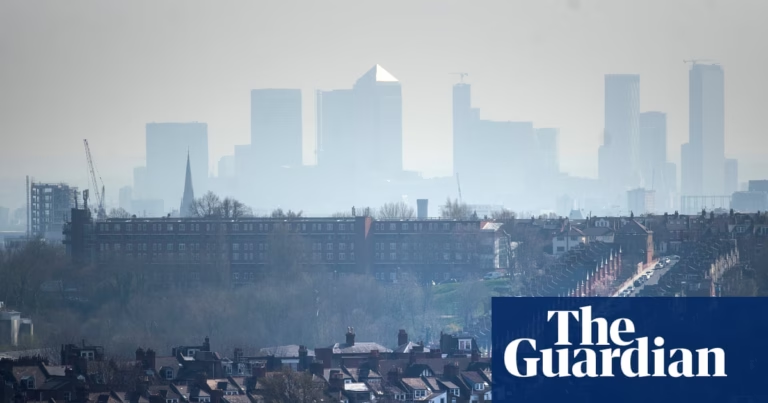<
div>
When Jade and her family first arrived at the detention facility in Karnes county, Texas, she wasn’t really sure what to think.
“I guess I was confused and scared,” said the 13-year-old. Her parents were doing their best to reassure her that everything would be OK, but she knew they were in danger of being deported.
She and her parents were one of the first to be sent to Karnes – one of two detention centers the Trump administration has commissioned to hold immigrant families. At first, she was the only kid – as far as she could tell – in the sprawling beige structure. Immigration officials had confiscated her family’s belongings, including her phone and her Nintendo Switch.
There were a few books and games at the detention center, and a playground – but little else to distract her from her worries. “I just didn’t know what would happen to us,” she said.
The Texas-based legal non-profit Raices said it was aware of at least 100 families held at Karnes since early March, after the Trump administration restarted the practice known as “family detention” – locking up children along with their parents. Those detained include families who had recently crossed into the US, as well as those swept up in cities across the country. Among the youngest detainees was a one-year-old child.
Jade and her parents, Jason and Gabriela, are among the first to speak out about the conditions inside Karnes since being released. Now, back home in Mississippi, Jade said she’s still trying to make sense of what happened. “I don’t know how to explain it. It was weird,” she said. “I still feel confused and scared.”
The Biden administration suspended family detention in 2021 amid growing reports of sexual harassment and violence, medical neglect and inadequate food. The Trump administration has not only reinstated the practice, but Trump’s border czar, Tom Homan, has said the administration would seek to challenge a longstanding settlement that limits the amount of time children can be held in detention.
The Department of Homeland Security (DHS) assistant secretary Tricia McLaughlin said that “adults with children are housed in facilities that adequately provide for their safety, security, and medical needs”.
But human rights groups and pediatricians have said that these facilities – which are operated by private prison companies – are inherently harmful. In a letter to the Trump administration, several leading healthcare and pediatric groups, including the American Academy of Pediatrics, emphasized that “detention itself poses a threat to child health” and “even short periods of detention can cause psychological trauma and long-term mental health risks”.
“Children experience time differently than adults do, and even brief periods of detention can have long term devastating consequences on a child’s development,” said Elora Mukherjee, director of the Immigrants’ Rights Clinic at Columbia Law School. “It’s cruel.”
‘I wanted to cry the whole time’
Jade and her family had fled a surge of violence in Colombia in 2022, and had managed to make a good life for themselves in Mississippi.
But things changed this year as the Trump administration ramped up its immigration crackdown. Jade was afraid to go to school, worried that immigration agents could come find her there, or take her parents while she was away. Jason and Gabriela had trouble finding work – employers had become squeamish about hiring workers without a legal status.
“It was a very, very tough situation – it had become impossible to continue living here,” Jason told the Guardian in Spanish.
So they decided to leave. Jade packed up her most prized possessions, including her Nintendo and all her favorite clothes. “I was like, I’m excited,” she said. “I’m going to Canada. I’m going to make new friends.”
But they never made it to Canada.
At first, they encountered Canadian border agents and tried to explain they were seeking asylum. But those agents told them they’d be ineligible, and turned them over to US border officials. “That’s when everything got out of hand,” Jason said.
Agents handcuffed him and Gabriela, and drove them to Plattsburgh, New York and then Buffalo. “I wanted to cry the whole time,” Gabriela said.
“Our daughter had never seen us like that – handcuffed like prisoners,” Jason added.
In Buffalo, they were released from the cuffs, and sent via commercial flight to Texas. “The whole time we are trying to reassure our daughter, ‘Amor, nothing is wrong, it’s OK,’” Gabriela said. “But we didn’t have anything to distract her with, because she didn’t even have her Nintendo, her cellphone, she didn’t have her tablet, she couldn’t listen to music.”
By the time they entered the detention center – a sprawling concrete facility set against the dusty landscape of Karnes county, Texas – they were exhausted. “We were in a state of shock,” Gabriela told the Guardian. “Maximum shock – because we didn’t know what would happen to us.”
Jade was too young to remember the violence her family had left behind in Colombia, but Jason and Gabriela’s minds constantly flashed back to the threats and extortion they had faced. “It was anguish on a daily basis,” she said.
During their first few days in detention, they didn’t know who to call for help. “How else do we fight for ourselves? We have nothing here,” Jason said. “Each day like this was torture.”
Officials had confiscated all their things, and the family was given second-hand clothes and towels to use. They were able to buy minutes to make phone calls, but it was expensive.
Gabriela and Jason struggled to find the words to help their daughter. “Imagine seeing your child sad because they can’t go to school. And you can’t even say, ‘Let’s go to the corner. Let’s go get ice cream. Or some chips,’” Gabriela said. “How do you explain any of this to a child? Your mom can’t do anything for you, your dad can’t do anything.”
“She’s entering adolescence and everything that happens to her now will mark her. Everything that has happened could have broken her in some form, traumatized her,” she added. “That’s what distresses me as a mother.”
Eventually a few other families arrived at the facility, including siblings aged three, six and eight. The youngest ones didn’t understand what was happening, so they weren’t as scared as she was – but they were just as tired, Jade said.
She liked when the radio played at the detention center, especially when the Weeknd came on. “That’s my favorite singer,” she said. “I just tried to sit on the grass and listen, and look at the sky.”
<
p class=”dcr-16w5gq9″>Relief finally came when they were able to
Source: https://www.theguardian.com/us-news/ng-interactive/2025/apr/24/trump-immigration-families-detained








